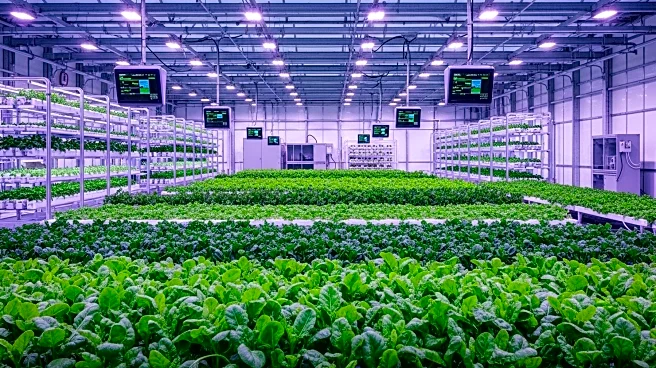What is the story about?
What's Happening?
The Controlled Environment Agriculture (CEA) market is projected to experience substantial growth from 2025 to 2032, with an estimated value increase from USD 54.56 billion in 2025 to USD 140.77 billion by 2032. This growth is driven by advancements in agricultural technologies and increased demand for sustainable food production methods. Key players in the market, such as AeroFarms, Plenty, and BrightFarms, are leading innovations in vertical farming and hydroponics, which are crucial components of CEA. The market report provides a comprehensive analysis of current trends, financial performance, and historical data, offering insights into the factors driving this growth. The report also highlights the competitive landscape, consumer behavior, and emerging opportunities within the CEA market.
Why It's Important?
The expansion of the Controlled Environment Agriculture market is significant for global food security and sustainability. As traditional farming faces challenges such as climate change and resource scarcity, CEA offers a viable alternative by enabling year-round production in controlled settings. This method reduces water usage and eliminates the need for pesticides, contributing to environmental conservation. The growth of CEA can lead to increased food production efficiency, supporting urban agriculture and reducing dependency on imports. Stakeholders, including investors and policymakers, stand to benefit from the economic opportunities and advancements in food technology that CEA presents.
What's Next?
The continued growth of the Controlled Environment Agriculture market will likely lead to further technological innovations and increased investment in sustainable farming practices. Companies involved in CEA are expected to expand their operations and explore new markets, particularly in urban areas where space is limited. Policymakers may focus on supporting CEA through incentives and regulations that promote sustainable agriculture. Additionally, research and development in CEA technologies will be crucial in addressing challenges related to scalability and cost-effectiveness.
Beyond the Headlines
The rise of Controlled Environment Agriculture could have broader implications for food culture and consumption patterns. As CEA becomes more prevalent, consumers may have access to fresher and more diverse produce, potentially shifting dietary habits. Furthermore, the ethical considerations of food production, such as labor practices and environmental impact, may gain prominence as CEA offers more transparent and controlled farming methods.
















